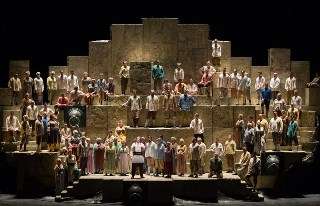|
Back
Domingo and Levine Carry On New York
Metropolitan Opera
12/12/2016 - & December 16, 19, 22, 27, 30, 2016, January 3, 7, 2017
Giuseppe Verdi: Nabucco
Dmitry Belosselskiy (Zaccaria), Russell Thomas*/Adam Diegel (Ismaele), Jamie Barton*/Nancy Fabiola Herrera (Fenena), Liudmyla Monastyrska*/Tatiana Melnychenko (Abigaille), Danielle Talamantes (Anna), Plácido Domingo*/Zeljko Lucic (Nabucco), Sava Vemic (High Priest of Baal), Eduardo Valdes (Abdallo)
The Metropolitan Opera Orchestra and Chorus, James Levine (conductor)
Elijah Moshinsky (production), John Napier (sets), Andreane Neofitou (costumes), Howard Harrison (lights)

(© Marty Sohl/Metropolitan Opera)
Nabucco was Giuseppe Verdi’s first important success, but the work’s musical oddities, dramatic flaws, and Biblical kitsch long kept it out of the standard repertoire. The Met only saw its first production in 1960 and has revisited it just once, with Elijah Moshinsky’s production of 2001. Its revival this season was noteworthy as it featured the Met’s music director emeritus James Levine on the podium, now long into the twilight of his career. On stage the title role fell to Plácido Domingo, the veteran tenor, conductor, arts administrator, and, more recently, baritone of sorts. Now well into their seventies, both men bring decades of experience and stardom.
The big question everyone wanted to answer was whether these sunset deployments could really work in practice. The rousing ovations suggested hope, or at least support, from a large segment of the audience. Alas, the effort portended the end of an era. Levine’s health problems have been in the news for years. His recovery was applauded and heralded. His occasional performances – a few stage productions a year and, until last season, reduced work with the Met Orchestra at Carnegie Hall – unfold with flashes of the lustrous direction well remembered from his prime. Last night the orchestra was in its customary good place. But Levine’s direction lagged, often sounding mechanical rather than dynamic and pedantic rather than inspired. Domingo, too, was out of his best sorts. The obvious problem is one of a tenor voice singing a part that should properly go to a sturdy baritone. In the past if one could accept that it was Plácido Domingo singing, then the evening could still pass quite enjoyably. Here physical limitations enforced an almost quaint “stand and sing” approach, even at Nabucco’s nastier scenes as a conqueror. It should be said, however, that there were also beautiful moments. In the Act IV aria “Dio di Giuda,” in which the insanity-stricken ruler pleads with the god of the Hebrews to restore his sound mind, the sonorous, cello-like voice we all remember emerged in excellent relief.
The remaining cast had only one real stand out in mezzo Jamie Barton, who sang the often overlooked role of Fenena. Russell Thomas’s Ismaele, her love interest, had some pleasant moments but tended to be overwhelmed by the orchestra. The central and extremely difficult role of Abigaille went to the Met’s stand-by Verdian dramatic soprano Liudmyla Monastyrska. The voice is big and wide-ranging enough to accommodate the part’s leaping high notes and grumbling lows. The middle range singing wafted with the occasionally majestic moment. Abigaille’s Act II aria “Anch’io dischiuso un giorno,” a plaintive memory of the kindness of which she has shorn herself, was well balanced and even touching. The more challenging elements, however, tended to lack focus. An overreliance on vibrato marred many of the choicest lines. The cadenzas betrayed distracting pitch problems.
Despite the tepid results, no one can fault the Met’s superb chorus, which delivered the famous “Va, pensiero” in perfect harmony. Encored in this production, it was the evening’s most vivid memory. Moshinsky’s highly traditional production, based on tiered stone blocks that suggest sites of the ancient world, does well enough. But it might be time for an updated effort and a more current cast.
Paul du Quenoy
|